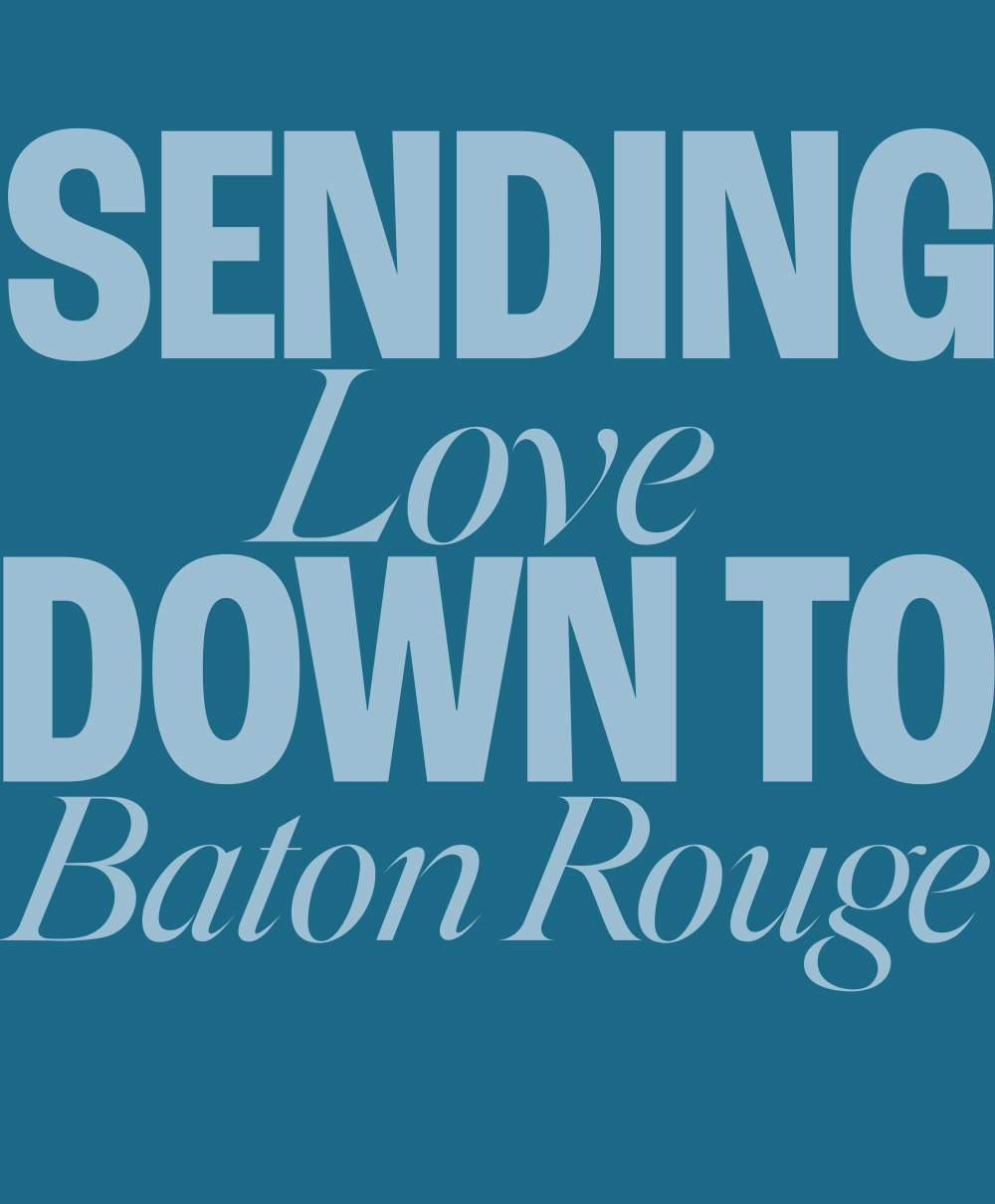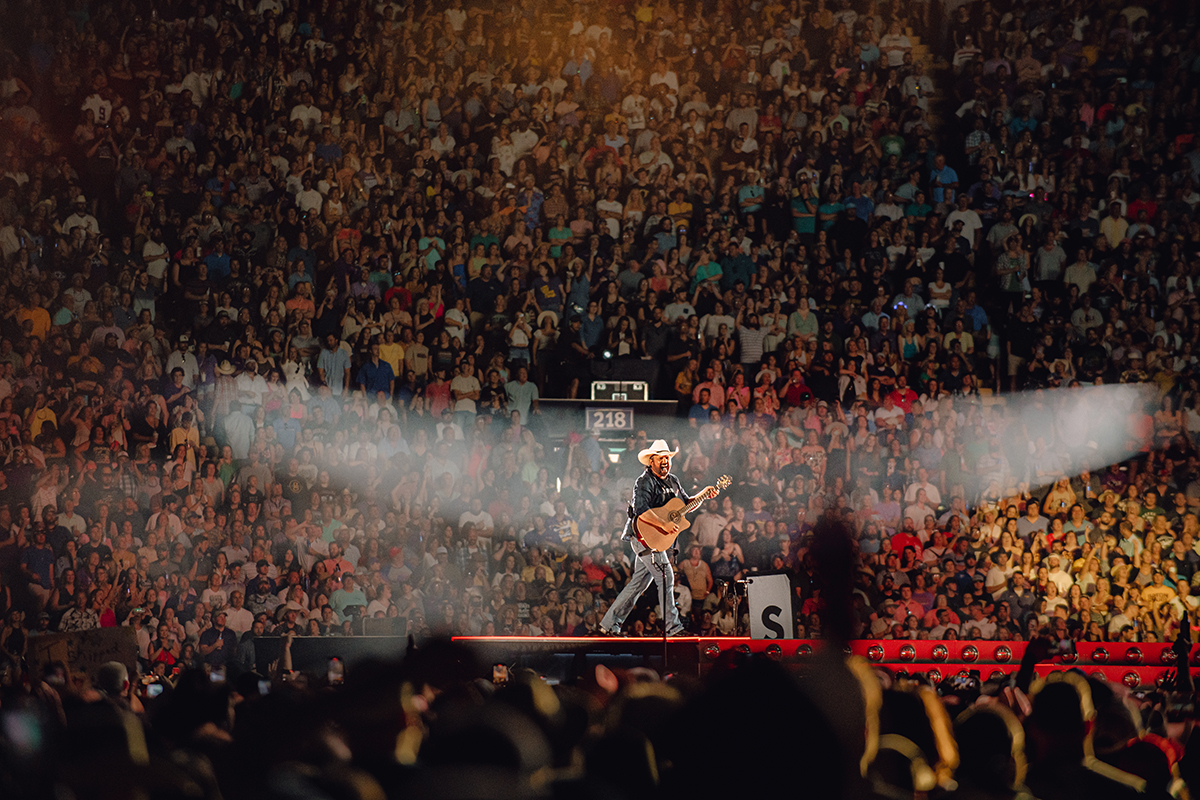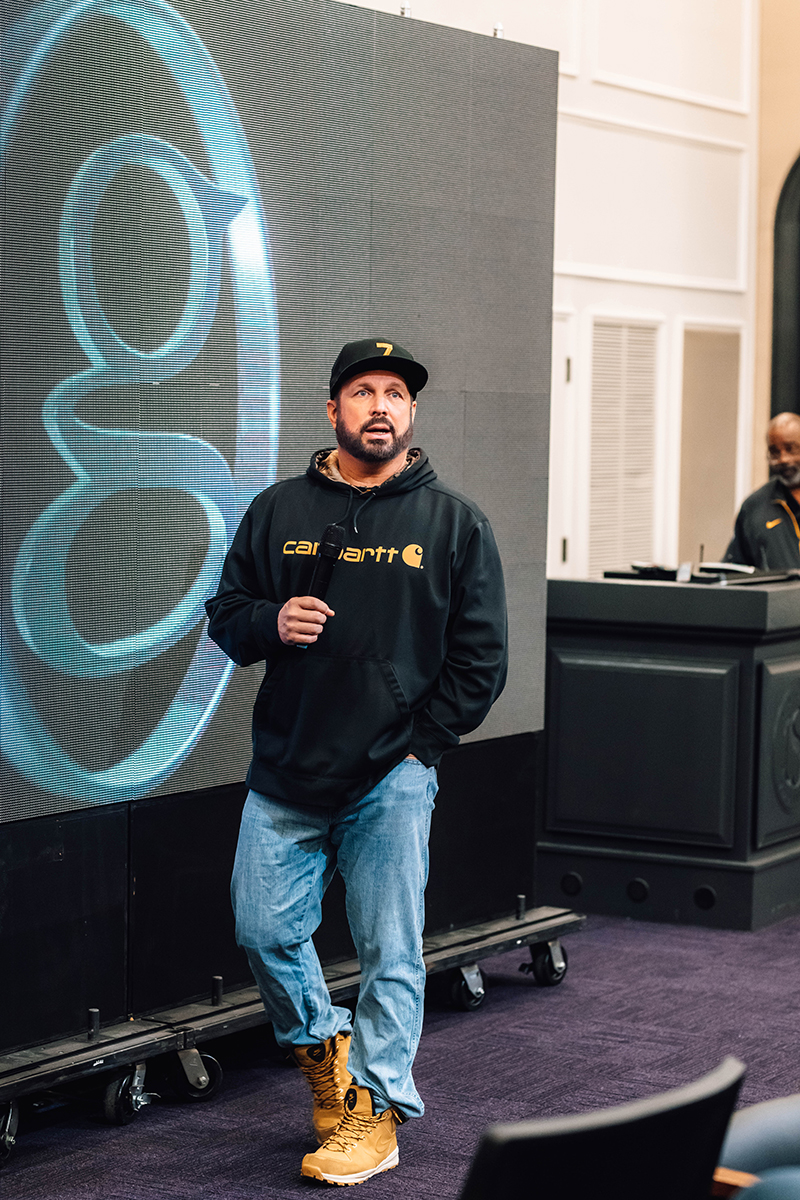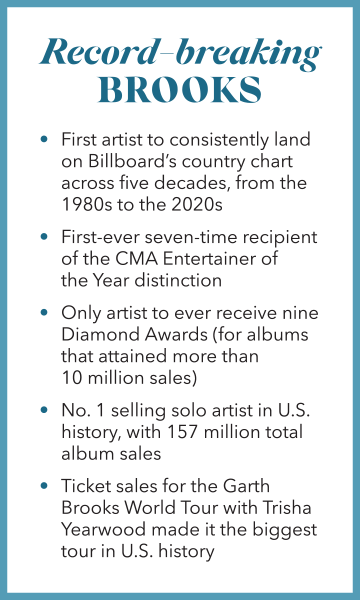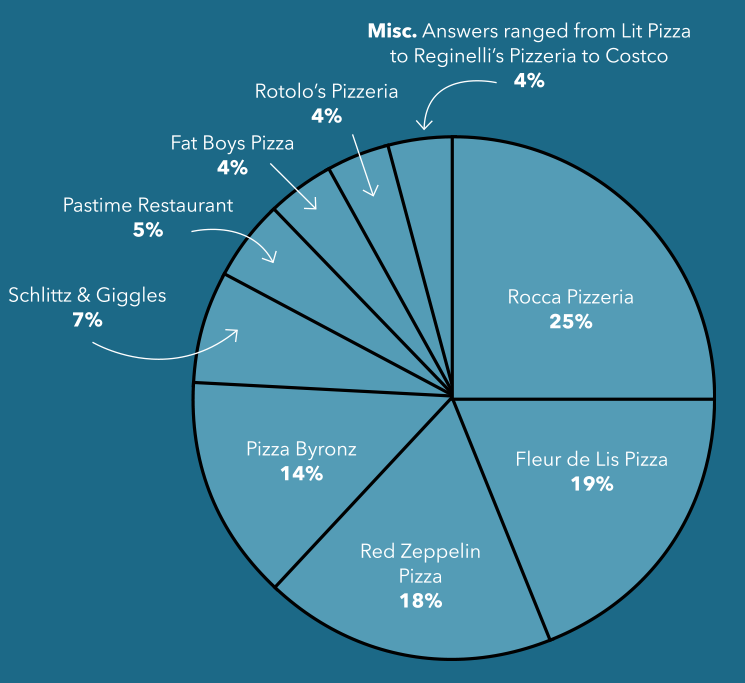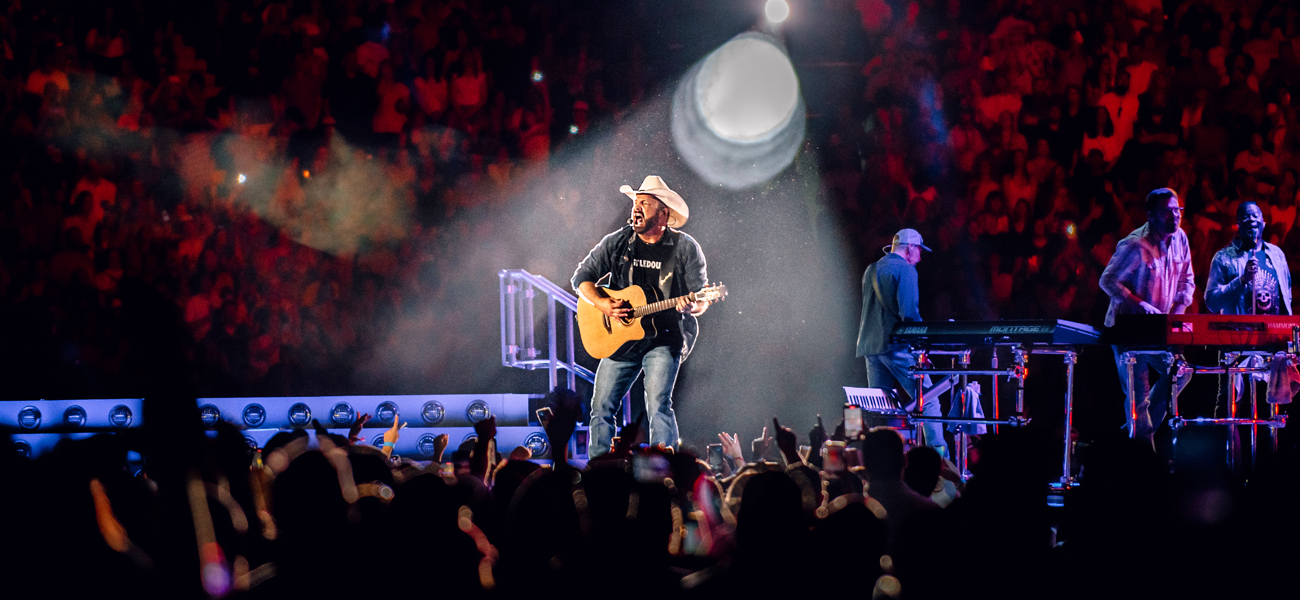
Garth Brooks rocked Baton Rouge with an earth-shaking quake in Tiger Stadium
Garth Brooks never considered himself a “cool kid.”
As the best-selling artist in the U.S.—and with countless awards and broken records to his name—that may be hard to believe. But it’s true.
|
|
He’s still in disbelief that younger generations look up to him like he looked up to Merle Haggard and Hank Williams. He finds it hard to put himself in a category with these country greats.
Still, for a guy who has played for thousands of people across the world, you’d think by now he’d consider himself a seasoned pro. On the eve of his Tiger Stadium debut, though, he’s a little nervous. He’s afraid of disappointing the crowd.
“You don’t win until you play the game,” he says the day before the big show. “The last thing I want to do is come out and disappoint 100,000 people. So my job is to keep that from happening all night.”
In fact, there have been 102,000 tickets claimed for this sold-out stop on the Garth Brooks Stadium Tour. LSU is about to host the second-largest stadium show in the United States.
No pressure, right?
Nervous or not, the historic significance of this show has Brooks fired up. This is a show that will surely put Baton Rouge in the national headlines before the weekend is over.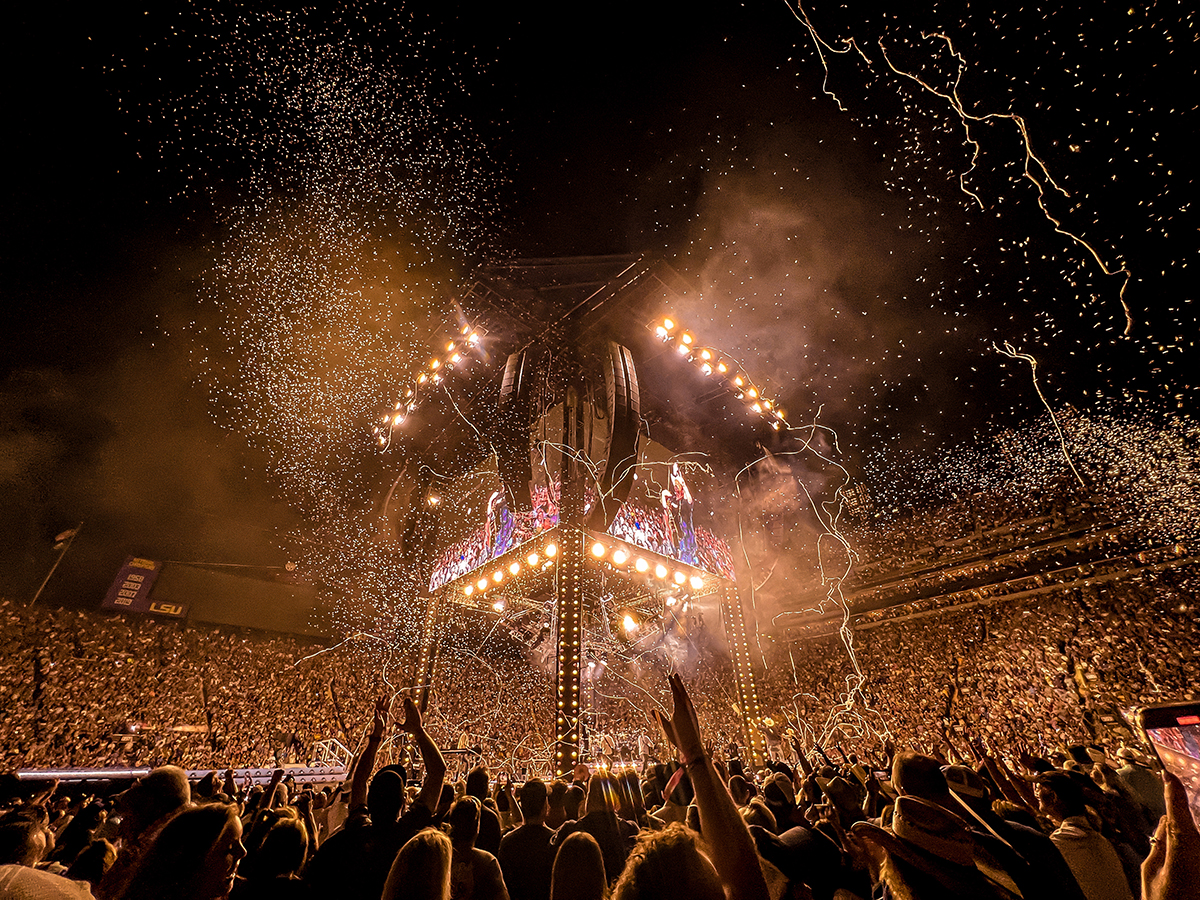
“This is going to be loud. This is going to be stupid. And it’s going to be all night long,” he promises reporters at an LSU press conference the Friday afternoon before the show.
Fast forward a little more than 24 hours, and as one of the thousands of people packed into Tiger Stadium the next night, I saw Brooks’ prediction come true.
He serenaded the crowd for more than three hours with 34 songs. And though the show was “long, loud and stupid,” none of us in the crowd wanted it to end.
I don’t think Brooks wanted it to, either. Seen from the stage’s big screens, the look of awe on Brooks’ face and twinkle in his eye made one thing clear: This night was just as special to him as it was to Baton Rouge.
The love this city shows to Brooks is something he still can’t wrap his head around. Though he’s an Oklahoma State University alum himself, he can’t deny this place owns a special spot in his heart.
“LSU is one of the coolest places on the planet,” Brooks tells us at the press conference. “You’re viewed that way from everybody outside because you’re not part of some big conglomerate, yet you’re still national champions. You’re still proud, and your colors stick out. So to get a nod from the cool kids, it’s very sweet.”
How many times has the average Baton Rouge resident heard Garth Brooks’ voice blaring over speakers? If you regularly attend LSU sporting events or festivals around town, by now you’ve probably lost count.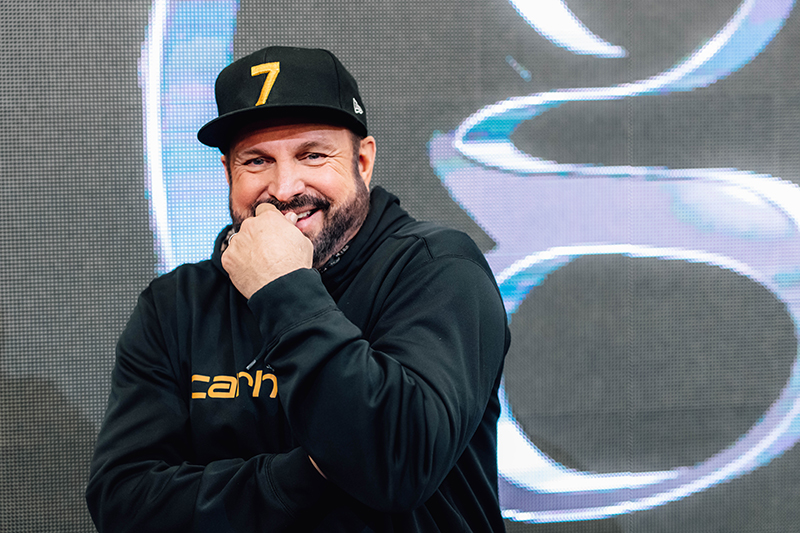
So, when I find out I’ll be interviewing Garth Brooks, I’ll confess: I’m arguably more nervous than Brooks is ahead of his sold-out show. This is the guy who I heard on my parents’ car radio growing up. He’s the voice behind the songs that soundtracked my college years. He’s one of the biggest country music acts of all time. No pressure, right?
When he walks into the room for the press conference wearing blue jeans and a Carhartt hoodie, it hits me. Brooks is a normal guy—who just so happened to sell out a concert in Tiger Stadium in less than two hours. Even with a room full of cameras, he is as casual as ever. He’s so comfortable, it makes me feel comfortable.
He jokes with me and the other reporters. He is just as interested in asking us questions as we are in learning about him. He wants to know the name of each person in the room. He even polls us about Baton Rouge’s best pizza restaurants.
Yes, the night before one of his biggest shows, Garth Brooks just wants pizza for dinner.
By the time he’s admitted he’s nervous about the show, my own anxiety has faded. To know that a big star like him gets nervous too makes the rest of us feel OK.
When it’s my turn to speak with Brooks one-on-one, he’s already remembered my name from the press conference introductions. He lets me ask as many questions as I want, and even asks me about my journalism background. He shares he also studied journalism in college. But of course, he says, “this music thing” took off instead.
When I thank him for the surreal experience, he gives me a kind smile and a hug.
It turns out Brooks is a normal, humble, funny guy. No pressure at all.
Before the iconic Saturday night in Tiger Stadium, Garth Brooks hadn’t performed in Baton Rouge for 24 years. So, like many at the April 30 show, I had never had the pleasure of seeing him in concert.
After navigating traffic, parking and the crowds of tailgaters—yes, the energy on campus was akin to a fall football Saturday—I finally take my seat in the stadium. The audience is universally giddy. We are about to witness Baton Rouge history. It’s going to be a big night for everyone.
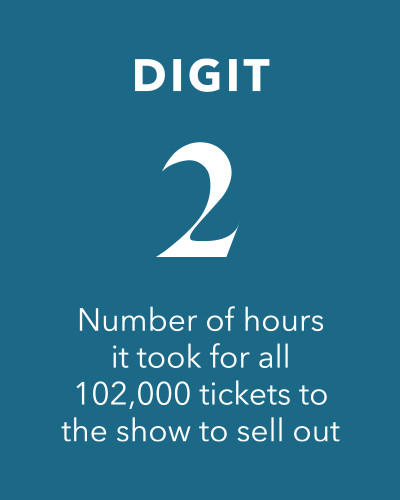 A clock on the big screens in the stadium counts down the last five minutes before the show. Then, Brooks emerges, now dressed more like the country music star he is. He’d traded yesterday’s flatbill ballcap for a cowboy hat and his hoodie for a flannel. He still dons blue jeans, only now they are dressed up with a huge, shining belt buckle.
A clock on the big screens in the stadium counts down the last five minutes before the show. Then, Brooks emerges, now dressed more like the country music star he is. He’d traded yesterday’s flatbill ballcap for a cowboy hat and his hoodie for a flannel. He still dons blue jeans, only now they are dressed up with a huge, shining belt buckle.
From the moment he takes the stage, he is instantly in his element. The stage’s 360-degree design allows Brooks to see every person who came to see him take the 17,000-square-foot stage that sits around where the 20-yard line would be on a game day. He hits all sides of the stage as he sings, giving each section of the crowd their own moment. A 60-year-old superstar, he bounces across the floor with kid-like energy.
A weather app clocks tonight’s temperatures in the 70s, but the lights and the crowds (and probably the palpable excitement, too) make it feel at least 10 degrees warmer. As Brooks bounds across the stage singing the first notes of “All Day Long,” it doesn’t take long for him to work up a sweat.
Even without the sweltering Louisiana humidity or the electric stage lighting playing a part, he’d probably still be sweating—as he pours his soul into every last song.
Tonight, Brooks is playing like a country legend. But on that stage, I can still see the normal, humble guy I’d met the day before.
Even during a three-hour set, Brooks takes the time to pause and talk to people in the crowd. He takes their song requests and reads every hand-drawn sign he can. Somehow, he makes all 102,000 of us feel special.
Brooks isn’t afraid to stray from the setlist. He wants to give the people what they want—even if it’s not a song of his own. When a fan asks to hear a George Strait song and a cover of Bob Seger, he can’t resist playing both. When fans request deep cuts from his old albums, he acts like nothing’s ever made him so happy.
It makes me think back to something Brooks said the day before: “I was always scared to play stadiums because I would think they’d be cold and distant. I didn’t think you could get that one-on-one connection. But I’ll tell you, it’s crazy how warm a stadium is.”
Even though I’m seated high up in the stands, one sign held by a fan on the floor keeps catching my eye. It reads: “6 chemos to go. Thank you for helping us through.”
I wonder if Brooks will acknowledge this sign as he did with so many other fans’ signs. And then, Brooks sets his mic down, sits at the end of the stage, hugs the woman and takes pictures with her family. It is a quiet, sweet, intimate moment.
After the show, the woman’s sister, Faith George Gliniecki, posts the full video in a public Facebook post. The up-close clip reveals Brooks’ personal message to the woman: “You have all of my strength. I love you,” he says.
The video quickly garners more than 300,000 views, with comments like: “What a man. He is just so down to earth, kind, caring. There are just not enough words to describe his humbleness & humility. Garth Brooks, you truly are one incredible human being.”
Gliniecki writes, “Huge shout out to Garth for making (my sister) so happy!!”
It’s not hard to see why Brooks gets so much of the music industry’s love, praise and recognition.
All night long, strangers clink their drinks together, high-fiving, singing along and swaying with their arms around each other. Suddenly, this massive stadium concert feels more like a sing-along with 102,000 of my closest friends.
The crowd seems to know every song’s words by heart. It seems hard to believe Brooks wasn’t well-received when he first came onto the country music scene, but this is how he remembers it.
Brooks released his first album in 1989 and quickly became a breakout artist to watch. The record peaked at No. 2 on Billboard’s country chart, and that same year, Brooks toured as an opening act for Kenny Rogers.
If you turned on a country station in Louisiana back then, there’s a good chance you would have heard songs like “If Tomorrow Never Comes” and “The Dance.”
While Brooks may have grown up listening to country legends, he liked rock ‘n’ roll too. Boston, Queen and Styx were huge influences, and this showed in his music.
“Even though I was raised on all these other guys, I can’t deny that the Eagles, James Taylor and Bob Seger have an influence on my music,” Brooks says.
Back then, he says that made him one of the “bad guys” of country music. He didn’t sound traditional enough.
“As time goes on, we’ve become the old-sounding guys,” he says today. “And now the new guys are doing street thump, hip-hop and more pop stuff in there. They’re doing the exact same thing we did. They’re doing the exact same thing (Merle) Haggard did in his time. It’s just new to country music. The one thing that must run true in country music forever is sincerity.”
Tonight, it seems funny to think his classic rock influence could have ever made him an outcast. A fan requests a cover of “Night Moves” by Bob Segar, and no one has a problem singing along with Brooks’ renditions of “American Pie,” “Piano Man” and “Make You Feel My Love.”
It’s safe to say Brooks—and the country world—have come a long way.
As he plays his promised mix of “old songs, new songs and a ton of cowboy songs,” the crowd matches Brooks word for word. Of course, some songs are louder than others.
But there is one that makes the audience sing the hardest. You know this one.
Yes, “Callin’ Baton Rouge.”
Like all LSU alumni, I’ve heard this song at countless tailgates, game-days and parties. I’ve heard it sung by die-hard fans in the student section before the fourth quarter at a home game during the 2019 national championship season.
But nothing could prepare me for the screams after Brooks asks, “Baton Rouge, is it time?”
Before the show, Brooks tells me that there are going to be two performers onstage when “Callin’ Baton Rouge” plays live in Tiger Stadium: There’s the guy who’s got his “gut sucked in” while trying to keep time and hit all the notes. And there’s the guy who’s enjoying the moment and trying not to get choked up.
When fiddle player Jimmy Mattingly starts that opening note, Brooks becomes both those guys.
The crowd is deafening. As the song wraps up, Brooks leads the audience in a booming chant: “LSU. LSU. LSU.”
How could he not? This is the unofficial anthem for the team that’s so close to our hearts, and it’s being performed live for the first time to a stadium full of people who know every word.
With 102,000 fans screaming the lyrics, clapping and stomping to the beat, an LSU seismograph registers the commotion as an earthquake.
The only other time this has happened was in 1988 when the Tigers beat Auburn with a few minutes to spare.
So, there’s another record Brooks can add to his list.
“I hope those three minutes live up to what people were talking about,” Brooks had mused the day before.
It does.
This is three minutes of greatness. Three minutes of history. Three minutes we’ll still be talking about a month later.
Let’s be honest. A replay of that night’s events will roll through our minds for years to come.
After a packed setlist including a surprise encore appearance by Brooks’ better half, country star Trisha Yearwood, the band takes what I at first assume will be their final bows.
But, as the big screen pans to Brooks’ lone guitar on the stage, I know this youthful 60-year-old has a little more to give the crowd.
During his weekend in Baton Rouge, Brooks routinely likens the concert in Death Valley to a battle between him and the crowd. He even challenges fans to come with painted faces.
“What we encourage everybody to do is wear their colors,” he says. “I hope I see a lot of colors. I hope I see people wearing face paint tomorrow. I’m going to tell people to bring their helmet and their cup, because that’s the kind of night it’s going to be. The more this can be like a sporting event, trust me, the more fun it’s going to be for all of us.”
Surely, this is a battle a country legend like Brooks can win.
But as he goes back for that guitar, he swallows his pride and gives in to the crowd. Tonight, he says, Baton Rouge has won.
He treats the crowd to another encore, one it almost seems like Brooks wasn’t planning for but is thrilled to play. Covered in sweat and surely exhausted, he gives his all to the audience for three more songs.
From the look on his face, it’s clear he’s as much of a fan of us as we are of him. “Screw it,” he announces, “I’m moving here.”
The crowd roars back.
While Brooks may not be looking for a permanent residence in Baton Rouge, he knows he’s welcome here anytime. All he has to do is call.
Big picture:
What the concert meant for Baton Rouge
- Visit Baton Rouge invested $250,000 in sponsoring the event, in hopes that the publicity generated from the show would make more events like this possible in the future.
- Area hotels broke records, bringing in nearly $1.6 million on April 30. Hotels compared tourism levels to those seen during Alabama game weekends or the Bayou Country Superfest.
- With so many traveling to the event, Visit Baton Rouge used the opportunity to promote other events happening, such as Live After Five, and draw visitors to restaurants and shops offering specials over the weekend.
- Post-coverage of the show was featured in national outlets ranging from NPR to Sports Illustrated to People magazine.
- Hundreds of videos and photos were uploaded to social media following the show. If you live in Baton Rouge, there’s almost no chance you woke up Sunday morning and didn’t see at least one person in your feed reminiscing about the performance.
 Where did our Instagram and TikTok followers tell Brooks he should go to get the perfect slice of pizza?
Where did our Instagram and TikTok followers tell Brooks he should go to get the perfect slice of pizza?
This article was originally published in the June 2022 issue of 225 magazine.
|
|
|
